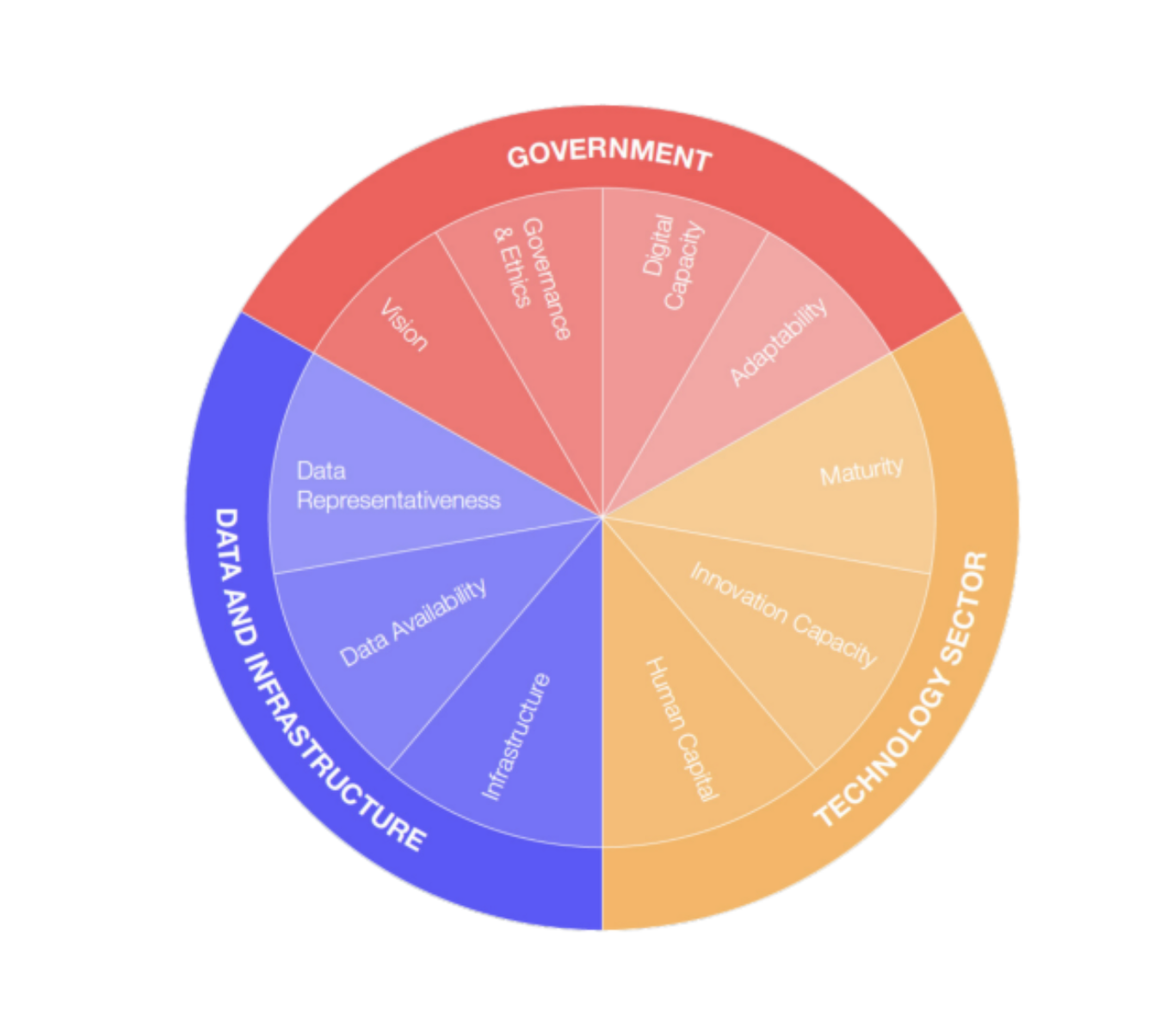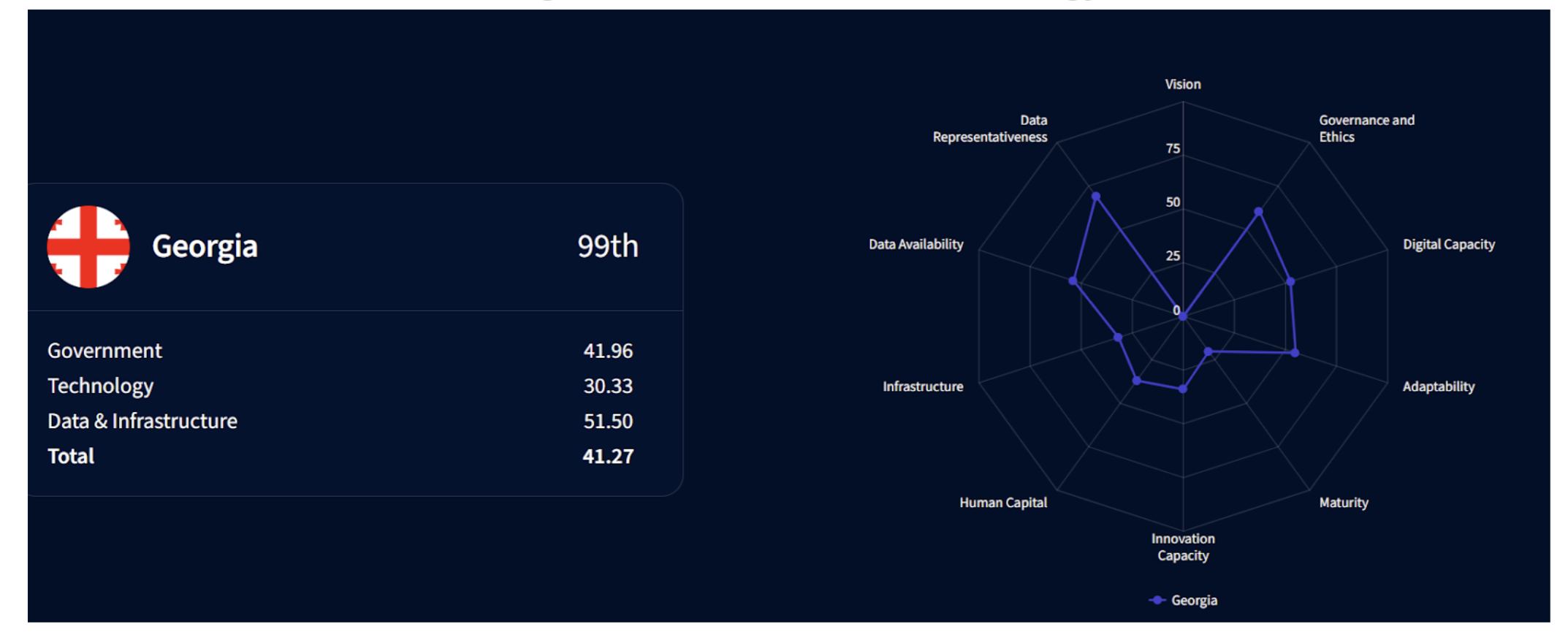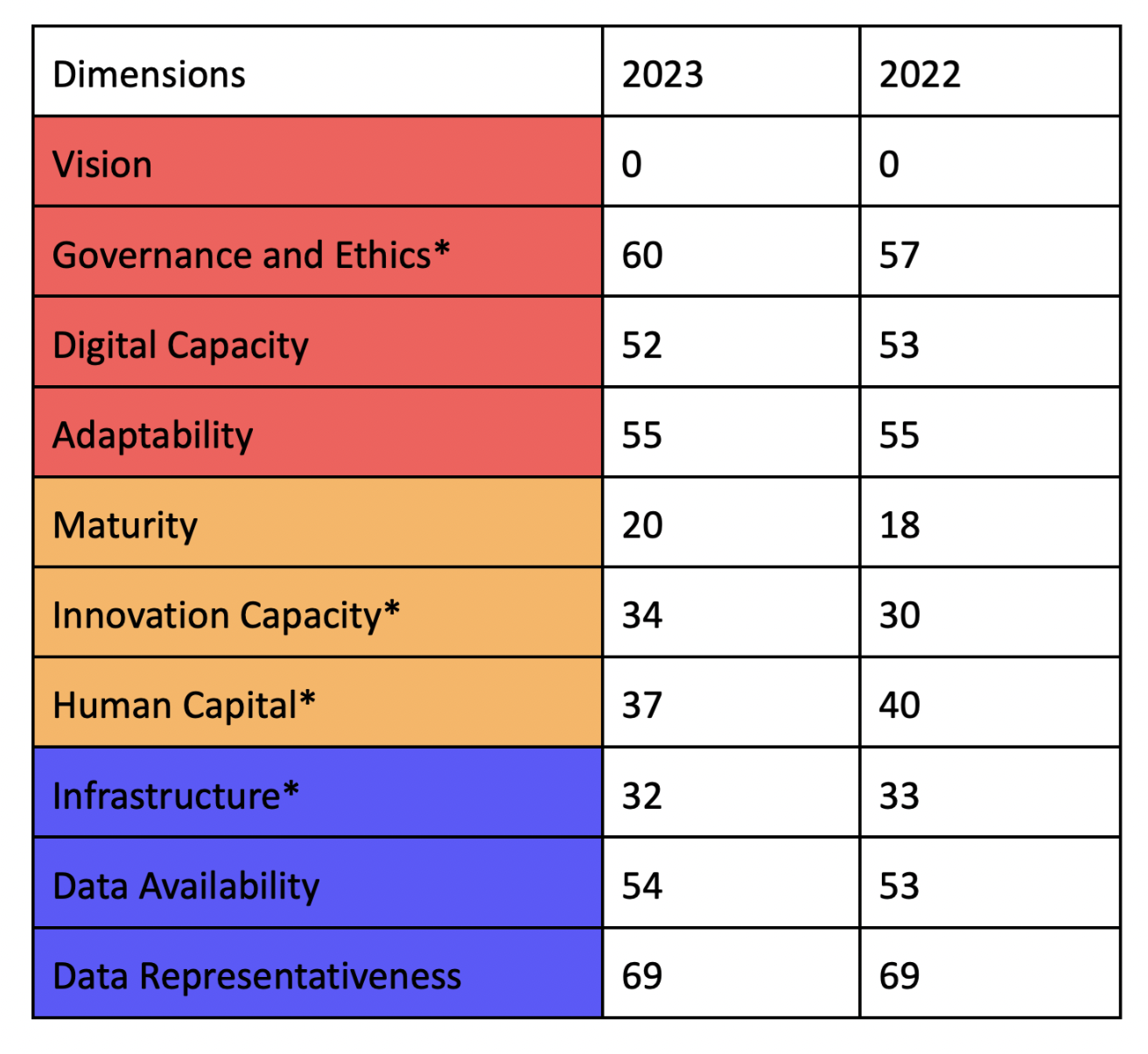


In December 2023, Oxford Insights - a consulting company based in Great Britain - published the Government AI Readiness Index. The study is being conducted since 2019 and measures a government’s readiness to introduce artificial intelligence into public services. The Index assessed 193 countries in 2023, including Georgia, which comes at the 99th spot in the rating and lags behind all neighboring and Eastern Partnership countries.
The Government AI Readiness Index evaluates governments in three main areas, comprising 10 dimension and 39 indicators.
According to the methodology, this area assesses the strategic vision of the government with regard to the implementation/use of artificial intelligence. In this case, the evaluation focuses on the extent to which the country’s strategy/policy is supported with corresponding regulations and ethical standards/framework (Governance and Ethics). This direction also assessed the digital capacity of governments, evaluating how easily they will be able to adapt in an environment of rapid technological development.
The second area assessed the readiness of the technology sector, as it plays a significant role in supplying artificial intelligence products to the government. Along with other characteristics, countries are evaluated based on: share of the information and telecommunications sector in trade and volume of government investment and assistance in innovation, research, and technology. In addition, human capital is an important indicator, especially in the area of technology and science.
AI products require a large volume of high-quality data to function (Data Availability). Therefore, the Index focuses on the development level of the information-telecommunication infrastructure and the availability of accurate, up-to-date, and representative data.

According to the 2023 results, Georgia received an average score of 41.27 and is in the 99th spot among 193 countries. Compared to 2022, the score improved by only 0.48. In 2023, Georgia received a higher score in the area of Data and Infrastructure (51.5 points), while the lowest score was assigned in the area of the Technology Sector.

Observing the individual indicators of all three areas, Georgia received a score of 0 in the dimension of strategic vision for AI. It also received low scores in the dimensions of telecommunications sector maturity and infrastructure.

*One of the indicators in these dimensions was changed in 2023, which should be taken into consideration when making comparisons across the years
Compared to 2022, Georgia’s score in 4 dimensions saw an improvement. Among these was Governance and Ethics, which evaluates the regulations and ethical standards of a country that are necessary for the legitimacy of and improving trust towards AI (e.g. law on data protection and confidentiality, cybersecurity strategy, accountability, and others). Some small growth in the technology sector maturity dimension should also be noted, which indicates that the private sector, which traditionally supplies the government with AI products, has been relatively strengthened. The Innovation Capacity dimension has also seen some growth, indicating that the environment has become more favorable for innovations for the technology sector. Against the background of increased access to the internet in the country, the score in Data Availability has also increased.
Compared to 2022, Georgia had a decrease in score in three dimensions: Digital Capacity, which includes online services and investments by the government in emerging technologies; Human Capital - the number of STEM (Science, Technology, Engineering and Math) graduated, ICT (Information and Communication Technology) skills, female graduated in STEM, etc.; and Infrastructure, which assesses the health of telecommunications infrastructure, 5G infrastructure, deployment of emerging technologies, supercomputers, and more.
Georgia’s score in three dimensions remained unchanged. As the country has not developed a national AI strategy, it received a score of 0 in the Vision dimension. Similar to Georgia, Armenia and Moldova have also not developed a national vision for the implementation of artificial intelligence. Azerbaijan only partially fulfills this dimension, while Ukraine and the Baltic states have done so in full. Georgia’s results in the dimensions of Adaptability and Data Representativeness of data are also unchanged.
While Georgia had a small improvement (+0.48 points) in its overall score in 2023, its position in the global rating worsened. In 2022, Georgia was in the 88th spot, while in 2023 it shifted to the 99th spot. One of the reasons for this shift in position was the expansion of the Index to include 193 countries, from 181 in the previous year. Nevertheless, this may also be related to the other countries implementing more ambitious and large-scale reforms and initiatives than Georgia in the area of new technologies. This is especially pertinent given that Georgia lags behind all of its neighbors and Eastern Partnership countries in general in all thematic areas. The only area where Georgia is slightly ahead of Moldova is the Technology Sector.

To ensure that Georgia’s score in the AI Readiness Index improves, it is crucial that the country define artificial intelligence in its legislation and begin working on elaborating the vision and strategy for AI. At this time, not only is there no specific document on the artificial intelligence development strategy, but the topic is not mentioned at all in Georgia’s development strategy “Vision 2030”. It should be noted that the country does not have an electronic governance strategy either.
Given the results of the study, the country is in need of human capital development as well. While the decrease in the score in this dimension can be partially explained by a change in one of the indicators, there has been no substantive progress in the unchanged indicators of this dimension (number of STEM graduates, quality of the higher education programs in engineering and technology) either, which underlines the need to encourage and develop STEM directions in the country (in schools, universities).
Georgia has shown some progress in the Maturity dimension compared to the previous years, but the score is still low compared to other countries. As such, it is crucial for Georgia to support the private sector in AI development and, in general, improve the business environment.